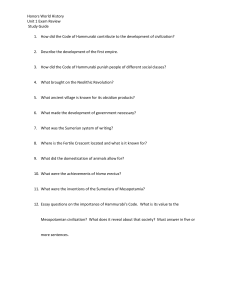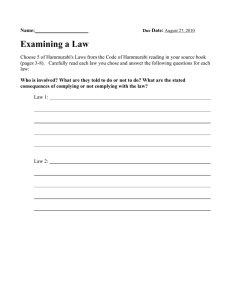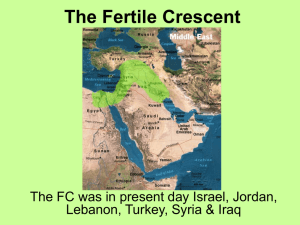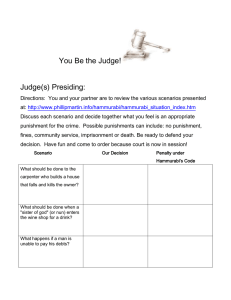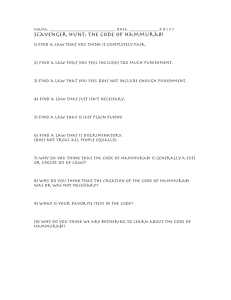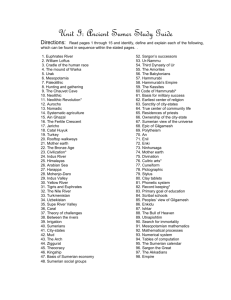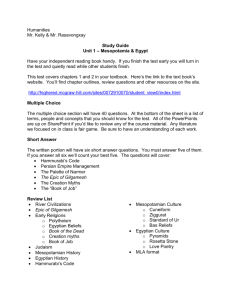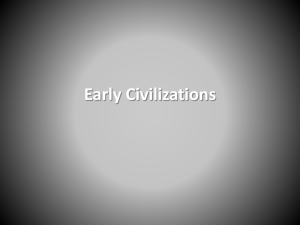Laws from Hammurabi's Code of Law
advertisement
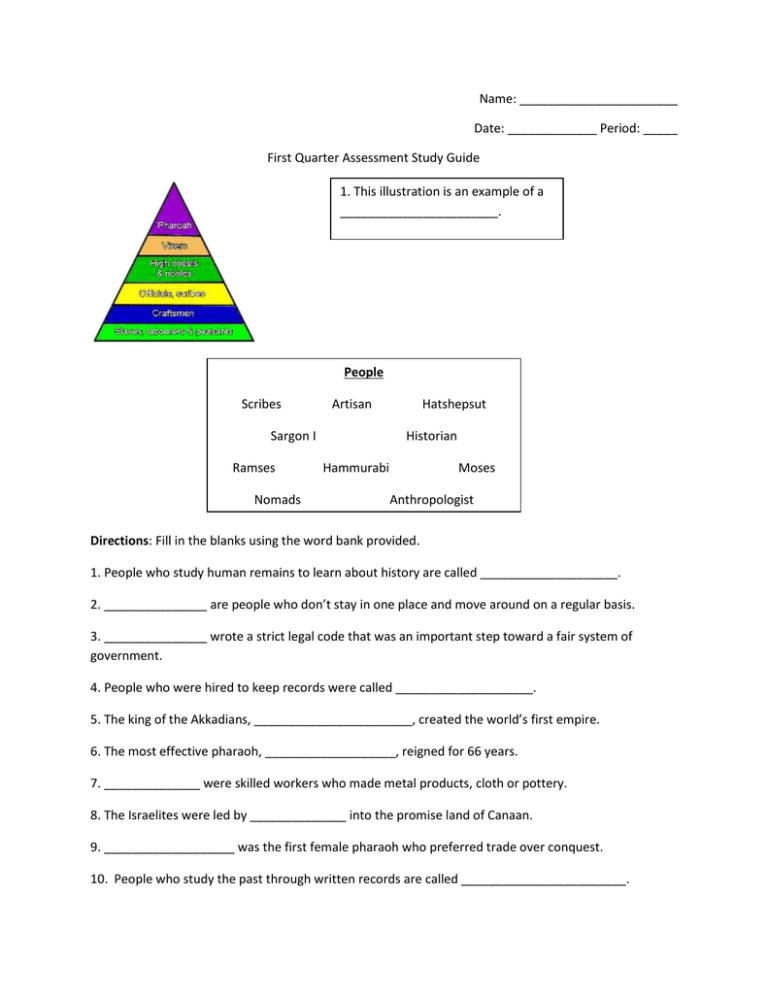
Name: _______________________ Date: _____________ Period: _____ First Quarter Assessment Study Guide 1. This illustration is an example of a _______________________. People Scribes Artisan Sargon I Ramses Nomads Hatshepsut Historian Hammurabi Moses Anthropologist Directions: Fill in the blanks using the word bank provided. 1. People who study human remains to learn about history are called ____________________. 2. _______________ are people who don’t stay in one place and move around on a regular basis. 3. _______________ wrote a strict legal code that was an important step toward a fair system of government. 4. People who were hired to keep records were called ____________________. 5. The king of the Akkadians, _______________________, created the world’s first empire. 6. The most effective pharaoh, ___________________, reigned for 66 years. 7. ______________ were skilled workers who made metal products, cloth or pottery. 8. The Israelites were led by ______________ into the promise land of Canaan. 9. ___________________ was the first female pharaoh who preferred trade over conquest. 10. People who study the past through written records are called ________________________. Completion Directions: Complete the following questions in complete sentences when appropriate. 11. List four different ways in which a ziggurat could be used. - ___________________________ -___________________________ -___________________________ -___________________________ 12. What was the first civilization? What is another name for the first civilization? _____________________________________________________________________________________ _____________________________________________________________________________________ 13. What is the difference between monotheism and polytheism? _____________________________________________________________________________________ _____________________________________________________________________________________ 14. Irrigation allowed people to (1.)____________________________________________________ and (2.)__________________________________________________________________________________. 15. When members of a family passed the ruling power from father to son to grandson that is called a ___________________________. 16. What is Sumerian writing called? What was Egyptian writing called? Sumerian = __________________________ Egyptian = _____________________________ 17. Define “Artifact” _____________________________________________________________________________________ 18. Define “Empire” _____________________________________________________________________________________ 19. Write a brief summary about the story of Moses and the Ten Commandments. _____________________________________________________________________________________ _____________________________________________________________________________________ _____________________________________________________________________________________ _____________________________________________________________________________________ _____________________________________________________________________________________ _____________________________________________________________________________________ 20. What is the day of the week is the Sabbath in Judaism? _________________________ 21. Read page 41 in your textbook about the Nile River flooding. What happened as a result of the floods? _____________________________________________________________________________________ _____________________________________________________________________________________ 22. Read about the Sahara on page 40. List three facts about the Sahara. - ____________________________________________________________________________________ - ____________________________________________________________________________________ - ____________________________________________________________________________________ Matching Directions: Match the definition with the correct term. Write your answer on the lines provided. _____ 1. Mud Bricks A. A waterfall _____2. Embalming B. Sumerian homes were made of this _____ 3. Cataract C. Period of forced absence from one’ country _____ 4. Exile D. Egyptian process of preserving a person’s body after death What are the three most important things exchanged through trade? ______________________ ________________________ __________________________ Name: ______________________ Date: _____ Period: ___ Read the chart above comparing Mesopotamia to Egypt then answer the following short answer question. Short Essay Question #1 1. If you were starting a civilization would you choose to start it in Mesopotamia or Egypt? Make sure to explain your answer. The following are some of the laws included in Hammurabi’s code of law. Read the laws and then answer the following short essay question. Laws from Hammurabi’s Code of Law Law 3: If someone falsely accuses someone else of certain crimes, then he shall be put to death. Law 5: If a judge makes an error through his own fault when trying a case, he must pay a fine, be removed from the judge’s bench, and never judge another case. Law 22: If someone is caught in the act of robbery, then he shall be put to death Law 195: If a son strikes a father, the son’s hands shall be cut off. Law 202: If someone strikes a man of higher rank, then he shall be whipped 60 times in public Short Essay Document Based Question #2 2. Were the laws fair or cruel? Take the role of a historian. Write a brief essay that explains how you view Hammurabi's laws. Be sure to use facts to support your position. You can compare Hammurabi's laws to our modern laws to support your argument.
